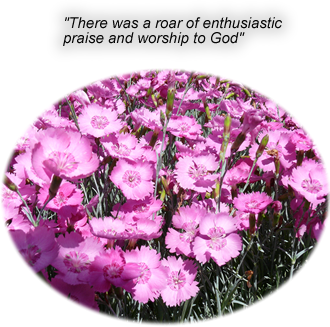Issue # 8 – Heroes of the Faith
ARTHUR BLESSITT (1940 – ): Evangelist
The life of Arthur Blessitt is better than fiction. Let’s start this amazing account on Sunset Strip, Hollywood, California. It is the summer of 1969, and the Strip has more than its share of hippies and junkies, cons and eccentrics, rockers and bikers, prostitutes and tourists. Chained to a light post is a twelve-foot wooden cross, and chained to the cross is Arthur Blessitt.
Why would a man chain himself to a cross? Here’s the story:
Sunset Strip was splattered with every type of nightclub, and Blessitt thought it only fitting to open a Jesus nightclub, a place where people could come and hear the gospel of Jesus Christ. He made a big cross, hung it on the front wall and preached under it every night at midnight. People of every stripe dropped in, many had their lives totally altered by the saving knowledge of Christ. Like Tom.
Tom was a rough and tough biker, one of the original Hell’s Angels. He walked into His Place, the name of the Jesus nightclub, just when Arthur was bolting the cross together. Arthur asked Tom for a wrench, but he was scared to go near that cross. Arthur and his wife Sherry prayed for Tom and soon led this hardened biker to Christ. Two weeks later Tom was dead, killed on the Hollywood Freeway, and Arthur was preaching Christ to a number of Hell’s Angels at Tom’s funeral. Five bikers accepted Jesus.
And so did many others under Blessitt’s ministry. A common sight was Sherry holding the babies while husband was inside a bar, handing out tracts, telling people of the availability of a new life in Christ. Sometimes he was even given permission to preach on stage. And later in the night many came to His Place, where there was a team of Christian workers, for salvation.
Unfortunately some businessmen thought this Jesus nightclub was not suitable (or profitable) for Sunset Strip – and Blessitt was evicted. Arthur is a fighter and determined that this witness for Christ was not going to be removed from the Strip. The confrontation led to his arrest, three times, and a second eviction. In protest Blessitt chained himself to the cross, refusing to eat, determined to die if necessary. A man refusing to eat, chained to a cross on Hollywood’s Sunset Strip caused national coverage. Many came – some to gawk, some to scorn, some to hear about Christ. Like Bob Friedman, a news reporter for the Los Angeles Herald Examiner, who kept coming back, asking questions, and finally asking Christ to wash away his sins and give him that new life. After twenty-eight days of fasting the battle was over and Blessitt moved His Place into a rented building.
Two weeks later God spoke to Blessitt’s heart, instructing him to carry the cross, the one hanging on the wall in His Place, across America – to bring people’s attention to their need for Christ and the sacrifice of love made many years ago in payment for their sins. It was decided a team of four would depart at ten a.m. Christmas morning, 1969, and arrive in Washington, D.C. sometime in July. The three associates were to sing and hand out tracts, and Blessitt would carry the cross.
However, shortly before Christmas Blessitt had a stroke. The doctor gave a glum report. “Mr. Blessitt, you need brain surgery immediately. You have an aneurysm in your brain, an abnormal dilation of the blood vessel wall, a blood vessel blown out like a balloon. This is seeping blood, causing your problem.” Arthur left the hospital to think it over and pray. Should he go with the cross or have the operation? He decided he would rather die in the will of God than live in disobedience. He would carry the cross across America! At that decision a great joy swept over him. Sherry helped him to the bathroom and together with their small children they huddled in prayer as the swirling water flushed his medication down the toilet.
There were about 200 people to see them off that Christmas day – reporters, hippies, Christian workers, bikers, junkies. They hadn’t got far when they were confronted by a deranged man with a big two-by-four in his hands, a pointed nail sticking through at one end. One of Blessitt’s friends was a former black militant, another a Vietnam vet, both capable of handling this. But Blessitt felt the Lord saying this was not the way, and he shouted to his associates, “Fellows, we can’t touch him. I’ve never used violence, we can’t begin now. If we live we live…if you can’t take it…run. If we die, we die…but we can’t touch him.”
When the man began to swing the board at Blessitt, one of the others stood in front of him, ready to take the blow. They both said, “In Jesus name,” and the man, though raging, seemed to be unable to move. Sherry, towing their trailer behind the group, was yelling, and the kids crying and screaming. The men simply bowed their heads in prayer, placing themselves in the care of Jesus. The deranged man fell to his knees weeping, the spiked board laid on the sidewalk. Though he would not accept Christ, the confrontation was over.
The sight of a man carrying a cross along the roadsides of America was to be repeated in many countries in the years to come. The busy lives of men and women and children were suddenly invaded with the reminder of the cross, the most critical event of man’s 7,000 year history. At least temporarily the focus was on Christ. The very sight of the man and the cross was a challenge for people to consider and reconsider the Man who carried the cross from Jerusalem, outside the city gate, to Calvary almost two thousand years ago, the Man unlike any other man who died an innocent death in payment for the sins of all people.
3500 miles later, the small troupe arrived in Washington, D.C. There Blessitt suffered a stroke. Friends urged him to go to the hospital but instead he preached Christ to the people, and entered into a forty day period of fasting and praying. The media coverage attracted many people. The team fed the hungry peanut butter sandwiches and ministered to people all day and all night.
The excursion across his homeland country was just the beginning. Countless millions from a total of 71 nations have witnessed the man and the cross walking their roadsides. His adventures are more numerous than the blisters on his feet, incredible adventures with God who not only leads him from nation to nation, but from airport to street to hotel to village to restaurant. For without God it is impossible for a man to walk into a hostile country with a 12 foot cross where he is often an easy target on some deserted road, and come out again, especially since the Person that the cross represents is the most hated (as well as the most loved) person in humanity’s history, the One who like no other divides men, the very One around whom relevance revolves.
How does a man survive a firing squad? Or weeks of drinking putrid, infected swamp water? Or walking with a cross through no-man’s land in the middle of a raging war? The only explanation is God. The carrying of the cross through the nations is all God’s planning, God’s leading, God’s timing, God’s provision.
It takes God to get a man with a cross through the customs of a communist country that doesn’t allow religious symbolisms. Like Bulgaria. The Lord told Arthur to just walk through customs, not to look to the left or the right, just straight ahead. So he just walked through the customs with his 12 foot cross, out the airport and into the street where he prayed for further direction. And there was Poland, 1981. “Are you going to take it with you when you leave Poland,” the customs lady asked, “or are you going to leave it in Poland?” Blessitt replied, “I am going to take it with me.” She stamped his papers and let him through!
Few have felt the awesome, tender, incomparable and undescribable presence of God as has this disciple of Christ. For a great anointing was upon Blessitt’s life. He felt the call to preach the Word at fifteen and his Dad prayed a double portion of God’s anointing on his son because he himself had been called to preach, but refused the calling. And his grandfather, who also disobeyed the same calling, likewise prayed a double blessing. The cross, the man, and the anointing – a powerful combination. Few men have seen such miracles, such healings, so many tears of repentance. Few have had such adventures.
The first visit to Poland was in 1981. The Catholic Poles were immediately attracted to the man with the cross, the man who would dare carry the cross through their country embodied in strife with the Communist government, a country where Bibles had to be smuggled in. They came in taxis, bicycles, motorcycles, on foot. Women with baby buggies, women in their seventies and eighties, young girls. Men, women, teenagers, children – they came to see the cross, to touch it, to kiss it. The crowds got larger and larger. Men left their jobs, kids were released from school. Sometimes they covered the cross with food, other times with flowers. They kissed him and they kissed the cross. Though Blessitt couldn’t speak their language, the power of God would fall on the crowds and there was such weeping and joy. They cried together, tears of mutual love for their Savior who bore their sins on a similar cross 2,000 years ago.
One day Arthur was traveling through a small village, his feet burning, his entire body aching under the weight of the 80-pound cross. The street was lined with people, the crowd enlarging by the minute. Traffic was stopped as the crowd followed him. He looked across a large field to see the unforgettable – thousands of people coming – some running, some on horseback, some in cars and trucks – coming toward him, coming to see the cross. Crying, smiling, laughing. The glory of God had come! Such a spiritual awakening. Through a lady who spoke English, he preached the simple gospel of Christ with fervor and urgency.
Day after day they came in great numbers from all over Poland. Many hundreds of Poles found the new life that Jesus came to give. Such an awesome presence of God. So many tears of repentance and joy.
Several times he returned to Poland. In 1982, the country was under martial law, he felt an urgency to take the cross to the people. He was prepared for trouble. Starting his walk at the National Military Headquarters in Warsaw, he was soon in jail, and many who happened to be there were swept up in the arrest, including newsmen and NBC cameramen. God intervened and he was soon released with the blessing of the authorities to go wherever he wished in Poland. The miraculous had happened – the man with the cross was free to travel unhindered throughout Poland during martial law! The publicity of the arrest and release stirred multitudes to come. He was asked to lead the yearly pilgrimage to the small town of Czestochowa which had temporarily swelled to 70,000 people. Many opportunities were given by the priests to preach in Catholic churches. Thousands upon thousands of Catholics came to the saving knowledge of Jesus Christ. Like Anna.
Anna was a beautiful young lady who came running to meet the man with the cross. Someone had told her this man could introduce her to Jesus. Tears were running down her face, her legs were bloodied from walking up a certain hillside on her knees, trying to prove her love for Christ and trying desperately to find Him. Blessitt was moved by this young lady’s sincerity and told her through an interpreter, “Jesus loved you before you ever started up that hill and He loves you now that you have come down. All that blood was not necessary. He has already shed His blood for you. Now I know He appreciates your desire to show your love, but you don’t have to do that to prove you love Him. He can live in your heart.”
After explaining the simple salvation message, he led Anna in prayer, she accepted Christ into her heart and life, and soon she was running down the road shouting, “I have found Jesus! I found Him, now I know Him. That is all I need. Now I can go. I found Him! I found Him!”
Blessitt also went to places that never heard of the cross, never heard of Jesus, never heard of the new life. Like the Darien Gap in South America.
The Darien Gap is a 400 mile strip of swamp, jungle and mountains connecting North and South America. It is part of the journey one must take on a walk from Mexico to Columbia, which God had directed Blessitt to make. This jungle doesn’t lack the difficulties and dangers of other jungles in the world; it is so thick in places one couldn’t see a huge waterfall a few feet ahead. A machete for cutting a path is a necessary tool in most places. There are panthers, various poisonous snakes, scorpions, leeches, contaminated water, and numerous diseases common to a jungle. There are deep ravines, spiked sticks, and grass that cuts the flesh. To make such a journey, especially alone, is a feat few have accomplished; to do so with a twelve-foot, 80 pound cross takes God.
One day at a time. To make it through the day is the only ambition he could bear. The first day took more than thirteen hours to reach a small village. He was bruised, cut up and unbelievably exhausted. His shoulders ached from the weight of the cross, his feet blistered and bleeding. But before he could rest he preached Christ and the cross to the villagers in his faltering Spanish, for that was the purpose of it all. On and on he went, day after day, one village to the next, struggling through the thick jungle, stumbling, falling, climbing – and all the while there was the same aneurysm in his head that he had when he first started carrying the cross, his doctor having warned him that the slightest jar could cause a blood vessel to rip open, bringing immediate death.
He preached the gospel in villages where there was someone who could understand his Spanish, but often he could only dramatize Christ dying on the cross by leaning the cross against a hut, stretching his hands out and demonstrate nails being pounded into his hands and feet. With great agony he cried out to the Lord to make the natives understand that there is a God who cares, that a very special Person paid the price of their redemption. Many times naked men, women and children looked on at a white man with hands stretched out on the cross, sweaty, exhausted, a machete strapped to his side, a headband around his forehead, torn clothes, tears flowing down his dirty face, weeping. And then the glory would fall. One would cry in the presence of the Lord. Then others, and then the entire village. Arthur taught them to say Jesus, pointing to the cross, pointing to heaven, pointing to his heart, and then pointing to their hearts. Many understood, and were converted to the Lord Jesus Christ.
God had ways of publicizing the man with the cross, to bring focus on the cross to millions worldwide. This God did in the middle of the Darien Gap jungle.
Blessitt couldn’t believe his ears – a chain saw in this jungle? He chased the noise until he came to a caravan of seventeen people. They were making an excursion from the tip of South America to Alaska in two four-wheel-drive vehicles. He was so surprised at the sight of them, but they were amazed at the sight of him!
“What are you doing?” they asked.
“I’m carrying a cross,” Blessitt replied calmly.
He feasted on their kindness that day and left with food in his pockets. He preached the gospel to them, but most important the man with the cross appeared on television and in a magazine, giving worldwide coverage.
Blessitt often made the news – like that time in Paris, France….
Ministers invited him to speak at the Arc de Triumphe before a small group of Christians. But they told him the wrong day. Blessitt didn’t know it but he was walking into an official celebration where President Pompidieu was soon to arrive to give a speech.
When Blessitt and his wife Sherry and the children arrived they were quite pleased to see the great turnout! When the people saw the cross they opened a path for them. The soldiers let him pass. Amazingly, the steps were covered with a red carpet! – and up he went. He turned to the crowd and said in French, “Jesus loves you! Jesus loves you!” The press and television reported the event to all of France.
Most tourists avoid places in the world where there is conflict and war, but Arthur Blessitt is no ordinary tourist. Often God sends him to the very center of conflict, the sight of the cross having a dampening effect, taking some of the heat out of the dispute. Like Northern Ireland…
Five times Arthur went to Northern Ireland, the first time he took his wife and children. They knew the danger and walked right into it. Arthur and Sherry made arrangements for someone to look after their four children should they be killed. Into the heart of the war the Blessitt family strolled, down the devastated streets, past armored vehicles and armed soldiers. Bursts of firearms could be heard here and there. Sherry pushed two year old Joy and six month old Joshua in a buggy, Joy played with her doll and Joshua sucked on a bottle. Eight year old Gina and five year old Joel pasted Jesus Loves You stickers everywhere. Daddy carried the twelve foot cross.
Up the Catholic side, down the Protestant side. Snipers had Arthur in their gunsights on at least a few occasions but never pulled the trigger. At night they slept under blankets, fighting all around them, soldiers crawling right next to them. Often they were asked, “Why would you come over here in this war and bring your children?” The answer: “Because we care. God loves you. Jesus is the way. Give your life to Him and live in His steps.”
Arthur was invited to talk to a roomful of IRA gunmen and car bombers. He preached Christ and pleaded for love and forgiveness. One killer was on his way to a mass killing when he saw the man with the cross. Arthur and Sherry assured him that the blood of Christ was able to wash away his many sins of murder and violence, and led him to the new life in Christ. That night they were confronted by a group of armed men. One of them spoke up, “Reverend Blessitt, one of my men was changed by your sermon. He wanted out and we agreed to let him go. He was a good man…hard and accurate. We lost a good one. You must be something else. I’ve seen you around town and had my gunsight on you. Sometimes I’ve wanted to kill you and sometimes I wanted to join you. I just wanted to let you know that I have to admit, you’ve got guts. But if you ever speak of who I am or call the troops, you’re dead. I’m troubled. I can hardly sleep. Can you help me?”
There were so many like that, worn out by strife and killing and hate. The gospel of Christ was a refreshment to the soul, a beacon of hope in their tired land.
On one trip to Ireland, Arthur took Billy Graham with him, the world famous evangelist. Billy handed out Jesus Loves You stickers and shared with the British soldiers the love of God. When Graham put a red Jesus sticker on his stomach, Arthur advised him to lift it up higher to cover his heart, explaining that if a sniper was going to pull the trigger he would probably use the red sticker as a target – and if Billy got hit in the stomach he would do a lot of suffering before he died, but if he got shot in the heart he would die instantly. Billy removed the sticker and stuck it over his heart.
There were times on Blessitt’s world march that could be described as nothing less than glorious and awesome and inspiring. Like that day in Berlin, Germany, June 6, 1981 at the great Olympic Stadium. There was a huge Berlin For Jesus rally. Because the press and television had given him such vast coverage beforehand, the crowd that day was very large, about 15,000. Blessitt was to speak for fifteen minutes. At the end of his message he said, “This stadium was built by Hitler to commemorate the start of the olympics. In just a moment I am going to take this cross and carry it across the field, up the steps, and we are going to raise the Cross above where the torch once burned. I pray that those who hunger and thirst will be filled with the fire of the Holy Spirit. Another fire will be built today, but its flames didn’t begin today. It will never be extinguished. It began on the day of Pentecost and it will not die!”
As he traversed the playing field the glory of God was upon him and the glory fell on the crowd. There was a roar of enthusiastic praise and worship to God which escalated as Blessitt climbed the steps to the torch that was lit in 1936. He was boosted up the platform above the torch where he lifted the cross high in the sky. People spontaneously rushed toward the cross. There was an explosion of praise, people everywhere weeping for joy.
Kingdoms rise and kingdoms fall but the power of the cross has never diminished and never will.
There were times when the people were enthusiastic for him and the cross, but the authorities were antagonistic. Like Madrid, Spain…
It was in Madrid that over 100,000 Christians, in the fifteenth century, were burned at the stake or slain by other means, their crime being their faith in Jesus Christ.
November 11, 1972 was the day much of the city anticipated the arrival of “an hombre con la Crosse (the man with the cross).” Blessitt traveled from France, taking six weeks to get there. Sherry was there with one son, Joel. The National Television had cameramen on rooftops to catch the excitement. Newsmen from around the world were there. Blessitt’s picture covered almost the entire front page of Spain’s largest newspaper. Thousands of people lined the streets as he headed for Plaza Mayor, a cobblestone square surrounded by old magnificent buildings, the very place where Christians were martyred.
The crowd was huge, and it seemed like everyone wanted to get near the cross and the man carrying it. There was a sea of people with outstretched hands reaching for the cross, pushing to get to it, screaming in Spanish. Finally, with the help of the organizers, he was lifted on a platform and silenced the crowd with a wave of the hand. And then he preached through an interpreter: “Jesus came to die for you, for me, for everyone! With His death He paid for our sins. And with His resurrection He gave us abundant eternal life. Accept Jesus into your heart. Today is the day of salvation. Confess Him as your Lord and Savior and you will be saved.”
Police cars arrived and many policemen headed toward the cross. One angry officer told them to turn off the P.A. system and to leave. The interpreter showed him their permit but the officer insisted they stop. Blessitt and his companions refused to leave. They would make their stand, live or die. What an honor to shed blood on the very spot where so many thousands had shed their blood centuries previous. The crowd began to sing praises unto God, thousands of voices in beautiful harmony.
Suddenly the civil guards moved in, beating mercilessly at the defenseless crowd. The singing stopped. Click! Click! Click! went the face protectors of the civil guards as they marched on the crowd, swinging their clubs. One could hear the breaking of bones as they beat at random at men, women and children. One old lady was clubbed on the head and lay in a pool of her own blood. Loud screaming everywhere. On and on the beatings went because the people were trapped by those behind them and had no place to flee. But the beautiful crowd began to sing again, more intently than before. This was their day.
Then the guards turned toward Blessitt. They laid six year old Joel on the ground, Sherry covering him with her body to protect him from the clubs, and Arthur covering them both. Then a number of ministers fell on top of the Blessitts.
And then, seemingly miraculously, the beatings stopped. And then a verbal confrontation with the police again. The same police spokesman said, “I knew nothing about the civil guard attacking…I have orders to clear the Plaza. Disperse now or face arrest.” Blessitt’s emotions were high as he replied, “You have attacked and beaten a helpless crowd of people, including old women and children. They came in peace to listen to me speak about Jesus, as you reported in your newspapers. They had no order to leave, nor opportunity to do so. They were brutally beaten. I cannot move on. I must take my stand with them and the thousands of others whose blood has been spilled in the past years in this place. I have permission from your government to carry the cross and give my testimony. But I also have a right that is given by God and cannot be interfered with. I shall preach.”
When the interpreter translated those words into Spanish, the officer said, “I command you to leave.” At that, Blessitt put the cross on his shoulder, his wife clung to his side. Someone from the crowd took their child for safekeeping. Thousands watched in silence as Blessitt, Sherry and two helpers knelt in prayer, anticipating the next move. As the helmeted troops moved toward them once more, he shouted to the people, “Ask Jesus into your hearts. Give your life to Him. Do not return hate for hate, but love your enemies.”
They twisted his arms behind his back. He saw them dragging Sherry away. The interpreter was preaching as loud as he could while being carried off. They tried to pull Blessitt away from the cross but he clung to it with all his strength. A club came down on his ribs, another to his arm, another to his elbow. He hung on to the cross. They continued to beat him. Then they knocked him violently to the ground, the cross falling beside him. A guard grabbed him by the heels and dragged him roughly over the cobblestone.
One of the assistants grabbed the cross, lifted it high before the crowd, the people cried in unison, “Hallelujah!” Then he too was clubbed and kicked and thrown into a police car. Blessitt managed to get to the cross once more, lifting it to his shoulder and began to walk with it. Once more the clubs fell and soon he was thrown into a police car. As he was being driven away he watched as someone from the crowd picked up the cross, lifting it high, knowing that he was in for a beating, yet willing to pay the price. When man and cross were knocked to the ground another did the same, and another.
At the jail all those arrested were hugging each other, singing, laughing, praising God. Many times in different countries Blessitt had been arrested, and mysteriously released, and it happened again in Madrid. He refused to leave the jail until everyone was freed, and his cross returned. The next day he walked into a huge church auditorium, the cross on his shoulder, where much of the same crowd awaited him. The air was electrified. Such joy! Such hope! Such victory!
Few men have lived as Arthur Blessitt has lived, walked where he has walked, slept where he has slept, ate what he has eaten, or faced the impossible challenges he has faced. Seventy-one nations, many of them more than once, have witnessed the man with the cross walking their streets and telling their citizens about the Christ who paid the price of their salvation. He has carried the 12 foot, 80 pound cross over 25,000 miles, the longest walk being in Africa. Dozens of times he was thrown in jail, often in his own country. He has preached to the pope, to Arafat, to royalty, to generals. To prostitutes, to pimps, to prisoners, to addicts. To peasants, to students, to businessmen, to soldiers. To Arabs, to Canadians, to Russians, to Africans. To Catholics, to Protestants, to Hindus, to Muslims.
He has slept in a pigpen. He has slept in a prime minister’s home. He has slept on a plank between two benches. He has carried the cross in the 135 degree heat of Jordan and the 20 degree cold of Nova Scotia. He has walked alone, walked with his family, walked with friends. He has eaten monkey legs, roots, and many things that could not be identified. He has feasted on shrimp in El Salvador and salmon in Finland. He has drank contaminated water in the Darien Jungle, survived a raging sea storm near Papau New Guinea, faced a firing squad in Nicaragua, been choked by Los Angeles police. He was attacked by baboons in Kenya, crocodiles in Rhodesia, German shepherds in Israel, an elephant in Tanzania. He has preached to the lone peasant along the roadside and to a crowd of half a million at the Atlanta Rock Festival.
God took him through it all, and continues to lead him to this day. Chances are as you read this article Arthur Blessitt is carrying the cross in some distant land, carrying on his shoulder the reminder that the price of man’s sins has been paid in full.
The information in this article, and the article following, was obtained from the book, Arthur, A Pilgrim, written by Arthur Blessitt, published by Blessitt Publishing.


















